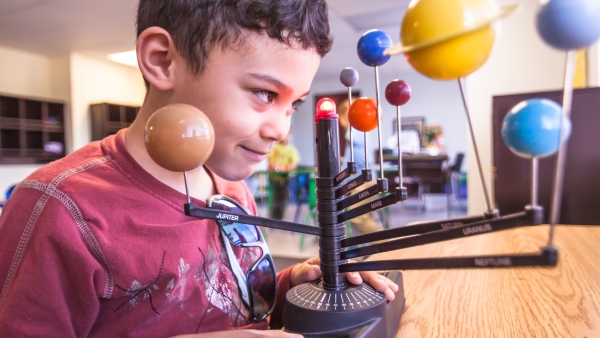
Maria Montessori opened her first classroom in 1907. At the time, her educational theories were based on study and observation. Now, more than a century after her first day of class, scientific research has started to support many of Dr. Montessori’s original claims.
The Hand and the Brain
Dr. Montessori believed that “the hands are the instrument of Man’s intelligence.” This statement reflects her observation of an important connection between what we do and what we learn.
Neurologically speaking, the hands contain three major nerves that are connected to the brain’s motor cortex. The hand-brain link is one of the most direct connections in the human nervous system, which may explain why using your hands can deepen your understanding of an object or situation.
Memory and Understanding
One of the most interesting neurological discoveries of the 2010s is the existence of mirror neurons. These neurons are created when a person observes or undertakes an action. When the action is repeated, the same neurons fire in proportion to the similarity between the new action and the old.
Mirror neurons pose many exciting potential explanations for human behavior. In the Montessori world, mirror neurons seem to confirm the idea that children can best learn concepts through action. By first observing and then repeating, students build a solid neurological foundation that will help them remember that action in the future.
Executive Functions
Your executive functions are the cognitive abilities that make you human. These include acts of organization, like planning or abstract thinking, and acts of regulation, like self-control and moral reasoning. Modern neurologists are able to map executive functions to activity in certain areas of the brain and have begun to develop an understanding of how these functions work on a biological level.
Maria Montessori actually theorized the existence of these functions. To her, they were known as human tendencies. She believed that a good education would help a child learn to use and control these tendencies to take agency over their own life.
Sensitive Periods
Based on her observations, Dr. Montessori came up with a list of the most sensitive periods in a child’s development. She argued that education was particularly important during these learning phases, and she even proposed curricula that would capitalize on the behaviors children are most prone to learning during each period.
These sensitive periods align well with a modern understanding of the stages of cognitive development. Montessori only had access to observations, so her model is focused on educational skill sets; however, her theory of the way a child adds new skills and abilities has turned out to be surprisingly accurate.
Modern Montessori teachers work to incorporate recent scientific understandings into the philosophies that Maria Montessori originally proposed. By prioritizing the cognitive development and mental wellbeing of students, Montessori schools are able to provide a wholesome educational experience that teaches children how to use all of the faculties at their disposal.





















